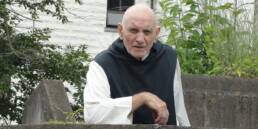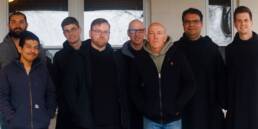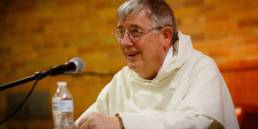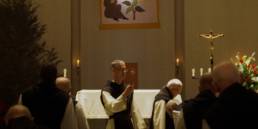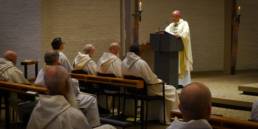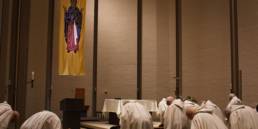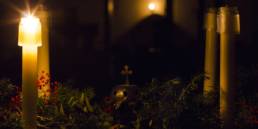May 7 was the Memorial of Chirstian de Chergé and companions, Trappist Martyrs in Algeria who were beatified in 2018. Their witness was featured in the 2010 film “Des Hommes et des Dieux” (“Of Gods and Men”), which won the Grand Prix at the Cannes Film Festival.
At Gethsemani, we remembered them liturgically in the Divine Office and at Mass, where Fr. Anton was the day’s homilist. Below are his Mass introduction and homily.
Introduction
My brothers, two dozen of us remember being here in March 1996, when the world was stunned by the kidnapping of seven Trappist monks in Algeria, being held for a prisoner exchange. Our entire Order joined in days of prayer for their safe return. 56 days later, the world was electrified by news of their death. France was horrified, every Catholich church tolled its bells at the same time in the monks’ memory. Seven lives for God and for the Church of Algeria.
The fundamentalist rebels had warned in French: “Leave Algeria or die! Algeria for Algerians! All foreigners out!” But the monks chose to stay, sheep in the midst of wolves.
It was learned after the funeral that Fr. Christian had written a letter two years previous, forgiving his future persecutors, sealed the letter, left it with his mother in France, to be opened only upon his death. It was his Last Testament, an amazing account of forgiveness. In the face of this remarkable peacemaker, who could forgive his enemies in advance, let us be sorry for not being able to forgive long after the fact.
Homily
“Who are these wearing white robes, and whence have they come?” – Revelation 7:13
They are the seven monks from Tibhirine, who lived together, died together, and will be remembered together for all eternity:
Dom Christian, age 59, the prior, 25 years in Algeria, a scholarly man who read both the Koran and the Bible in Arabic.
The Lay Brother Luc, the oldest at 82, the main cook, the doctor who treated over 800,000 Muslims during his 50 years in Algeria.
Father Christophe, the youngest at 45, the cantor and guitar player, in charge of workers in the garden and orchard.
Brother Michel, 52, the quiet one, in charge of readings for the Divine Office, the lector at Mass, a cook.
Father Bruno, 66, superior of the annex house in Morocco, just visiting to take part in the election of a prior.
Father Celestin, 62, a former diocesan priest, a helper of street people and addicts, who ended up a monk in Algeria to help.
Brother Paul, 57, a blacksmith, professional plumber, the jack-of-all trades who did all the maintenance work needed to keep the monastery going.
Though they died together almost 25 years ago, they’re still spreading the message of peace.
All of the murdered monks came from French monasteries to Our Lady of Atlas, in Tibhirine, Algeria, where they formed a typical monastic community, each with his own personality, his individual gifts.
They got caught in a war between the army and extremist rebels who wanted to force the French out of Algeria, a war of terror which ultimately claimed 44,000 people, mostly civilians, including 150 imams who dared preach against violence.
The monks’ neighbors were all muslims who trusted them, considered them friends, no different than any other inhabitant of the village, and repeatedly asked them not to go and leave them helpless.
When push came to shove, the monks united in their choice of remaining in Algeria, continuing their life of prayer and work, helping poor families with hand-me-downs, shoes, food, medicine as best they could, witnessing how possible it is for people to live in peaceful co-existence.
The seven monks died together after 56 days of detention. But they’re still spreading the gospel of Christ’s love, and challenging the romantic notions we have of SAINTS…that Saints are special people, who’ve been given special gifts of mystical prayer or penance, who live lives out of the ordinary, do things out of the ordinary, work many miracles.
On the contrary, all seven were markedly different, with his own sensitivities and opinions. We’ll never know their temptations, or weaknesses or failings, what personal obstacles they struggled with. We do know that, through their perseverance, God’s grace won out. They were able to give of themselves, and go together to the end of their journey, singing the praises of God, leaving a powerful witness to the world.
They’d likely smile now that their monastery has become a tourist hot-spot, a shrine of peace, because all along, they were simply Christians, living ordinary monastic lives, fulfilling the Great Commandment: love your God, love your neighbor.
Blessed Brothers of Tibhirine, pray for us that we also may be faithful witnesses!
Recent News
February 14, 2024
February 2, 2024 – Keith Connelly joins the community as a postulant
Keith Connelly joins us as a postulant
December 22, 2023
December 21, 2023 – The Close of our 175th Anniversary Year
We close our 175th Year Anniversary
December 10, 2023
December 8, 2023 – The Re-dedication of our Church to our Lady
The re-dedication of our abbey church…

